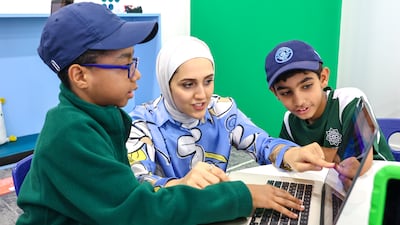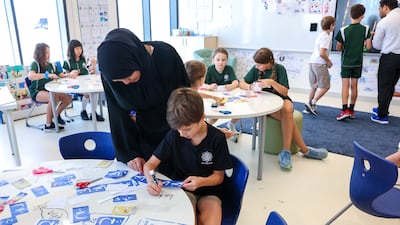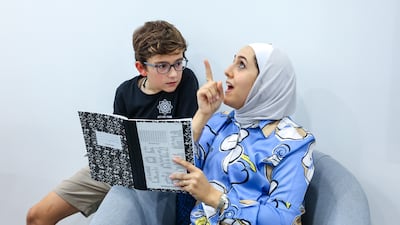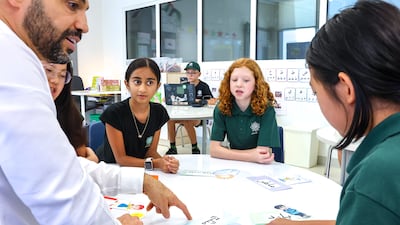Nurseries in Abu Dhabi will be required to employ at least one Arabic-speaking teacher and encouraged to provide additional training staff in support of a new drive to immerse children in the language from an early age.
Abu Dhabi's Department of Education and Knowledge said the mandate would be introduced at the emirate's 200-plus nurseries – referred to as early childhood institutes by the authority – for the 2025/26 academic year, which typically begins at the end of August.
Currently, Arabic lessons are compulsory for private school pupils in the capital from year 2 to year 10 (about six to 15) for non-native speakers and year 2 to 13 (about six to 18) for Arabic speakers.
While formal Arabic teaching will not be provided to nursery children – usually aged from about six weeks old to four – they will be exposed to the language through song, sounds and play.
“The idea is that language acquisition starts at the earliest age," said Sylvie Wald, education policy office director at the department.
"The idea is to expose them from an early age, because eventually, if they're going to stay in Abu Dhabi, they're going to be integrated into the school system and will have that foundational basis."
She said it was important to share the country's language and customs with expatriate children. "Here, we don't have very many opportunities for that, so being able to integrate that into the early education sector is something that we want to offer all of our expats," said Ms Wald.
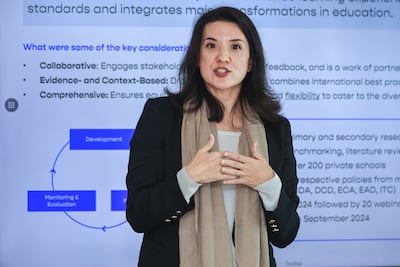
Nurseries are also being urged to train staff – who may not be in a teaching position - to take on the role of introducing children to the Arabic language.
Nurseries which fail to comply with the requirements will be warned before facing fines or other penalties. The department will conduct visits to ensure centres are following the rules and gather feedback from private schools and nurseries.
“The idea is to start by working with the schools to help them improve,” said Ms Wald. ". We don't want to penalise them."
Multilingual learners
Dr Hanadi Dayyeh, director of Arabic studies at the American Community School of Abu Dhabi, said the decision would be beneficial for young learners.
“I think this is a very, very powerful thing that they're doing,” Dr Dayyeh. “Children, up to the age of seven, can pick up four, five or six languages and they manage to navigate them.
“It comes naturally to them. It's definitely an added value to start as early as possible in being exposed to the language, whatever one you're learning.”
Abu Dhabi institute to revamp Arabic teaching - in pictures
UAE leaders have consistently highlighted the need to preserve and protect the Arabic language for generations to come.
Sheikh Abdullah bin Zayed, Deputy Prime Minister and Minister of Foreign Affairs, said in May there was an urgent need to foster Arabic language skills in young people. Sheikh Dr Sultan bin Muhammad Al Qasimi, Ruler of Sharjah, has also has long championed the preservation of a language spoken by more than 300 million people around the world.
Education action plan
The directive was one of more than 60 updated policies for private schools and nurseries issued by the authority on Wednesday, focusing on teaching and learning, health, safety, and the well-being of children and staff, as well as how schools are governed.
Under the strategy, nurseries must include Emirati dishes on their weekly meal plans and educate children about sustainability.
The department has also set out a new engagement policy, which will mean parents will be more involved in their children’s schools and receive regular updates.
Ms Wald said the department has considered the impact the new policies could have on education costs for nurseries and schools, and whether this will affect fees paid by parents.
“School fees are regulated by Adek based on the education cost index," she said. "We have looked at what type of financial impact this will have, and this has been built into future plans.
“Of course, any sort of increases will still have to come to Adek for approval and it will need to be justified but nonetheless there will not be any major differences from the previous increases that were sought by schools because they were already on a path for continuous improvement, which involved a lot of these changes.”
Sara Musallam, chairman of the department, said the strategy was key to the development of the capital's education sector. “By setting clear, research-based regulatory requirements, we create a path for continuous improvement across our private schools and early education institutes, ensuring our students are prepared to contribute to a globally competitive society," she said.
“The policies also ensure equity and consistency in the quality of education, providing transparency and accountability for educators, while enhancing the overall education experience for students and parents.”


